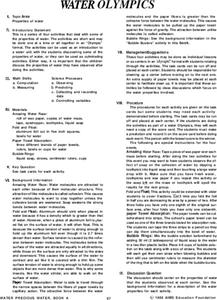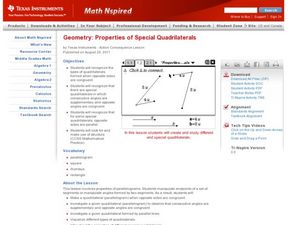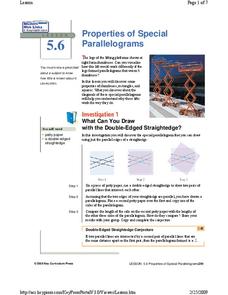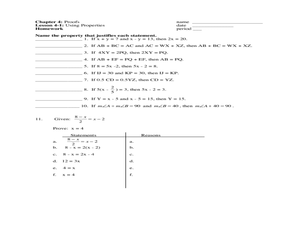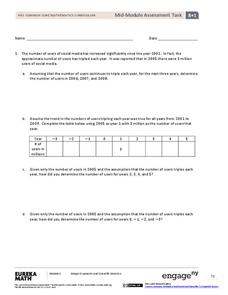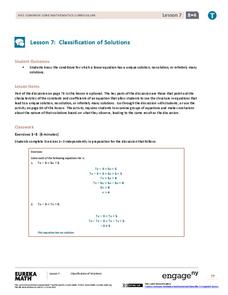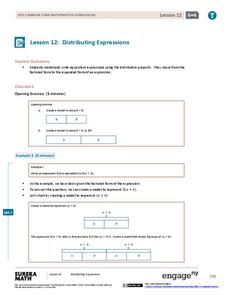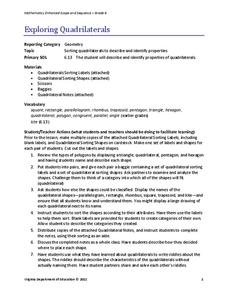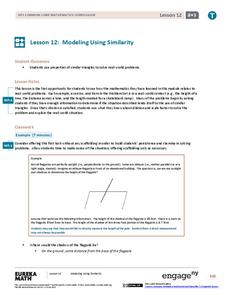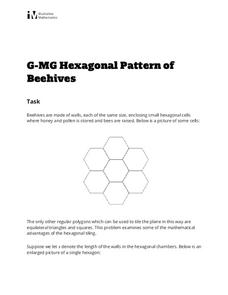CCSS Math Activities
Smarter Balanced Sample Items: 7th Grade Math – Target C
Pupils may be able to simplify expressions, but do they understand how to simplify an expression? A PowerPoint presentation gives several examples of Smarter Balanced Assessment items that test learners' understanding of the concept....
PHET
Area Model Introduction
Provide two views of multiplication. The introduction to an area model application has two modes. One mode shows the area of simple multiplication up to 12 by 12. The second mode shows how area models can be partitioned leading to the...
Radford University
Parallelogram Task
These floors were made for learning. Pupils use coordinate planes drawn on the classroom floor using tape to investigate parallelograms. They measure lengths, angles, and slopes to identify properties of parallelograms.
Curated OER
Water Olympics
A fascinating and engaging lesson on the properties of water awaits you. In it, learners engage in four activities that are designed to teach about the properties of water. This exciting plan has worksheets embedded in it which make the...
Baylor College
What Dissolves in Water?
One of water's claims to fame is as the universal solvent. Young physical scientists experiment to discover which materials dissolve in this special compound. You could never be more prepared for teaching this lesson than by using this...
Curated OER
It's Not All Greek to Me
Learners find out the meaning for prefixes used in math vocabulary. By dissecting words used in everyday math, they figure out what the prefix indicates and what the word means. A variety of well-organized worksheets and activities...
Curated OER
Properties of Special Quadrilaterals
Teach your mathematicians how to identify the properties of quadrilaterals. In this geometry lesson, learners solve for missing angles and sides of a special quadrilateral. They use the TI to move the sides around and create different...
Curated OER
Properties of Logarithms
Learners investigate properties of logarithmic function as they add, subtract and multiply logarithms. They graph and analyze the graph for exponential equivalency.
Curated OER
Distributive Property
In this distributive property instructional activity, students solve and complete 20 various types of problems using the distributive property. First, they simplify by distributing and collecting like terms. Then, students simplify each...
Key Curriculum Press
Properties of Special Parallelograms
Rhombuses, rectangles and squares are have special properties. In this lesson, young geometers investigate and make conjectures about diagonals, angles, and parallel lines of parallelograms.
Virginia Department of Education
A Mystery to Solve
Investigate field properties of real numbers. Scholars use a table for a given operation to determine the identity element. They use the same table to find a missing value in an equation.
Curated OER
2-D Shapes: properties Review
Play to review the various properties that help us identify 2-D shapes. Five different shapes are presented first by their properties only, these clues are then used to identify each shape. This is a great warm up activity, especially...
Curated OER
Commutative and Associative Properties
In this properties worksheet, students complete 4 matching problems regarding recognizing properties. Students then simplify 10 problems by combining like terms.
Curated OER
Using Properties Homework
In this geometry worksheet, 10th graders determine the property of the real number system that justifies each given statement and complete a two column proof in which they justifying the steps for solving an equation. The one page...
EngageNY
Least Common Multiple and Greatest Common Factor
Find the common denominator between prime factors, factor trees, and the distributive property. Scholars learn to find the least common multiple and greatest common factor of pairs of numbers. They rotate through stations to connect...
EngageNY
Mid-Module Assessment Task: Grade 8 Module 1
Assess your young mathematicians' knowledge and understanding of the properties of exponents. The questions in the seventh lesson of 15 incorporate the properties learned in the first six modules of this series. Individuals use and apply...
EngageNY
Negative Exponents and the Laws of Exponents
Apply the properties of exponents to expressions with negative exponents. The fifth lesson in the series explains the meaning of negative exponents through an exploration of the properties taught in the previous lessons of the...
EngageNY
Classification of Solutions
Is there one, none, or more? Through discussion or activity, scholars find the properties of an equation that will determine the number of solutions. They then use the properties discovered to figure out the number of solutions...
EngageNY
Distributing Expressions
You know how to factor expressions; now it's time to go the opposite way. Scholars learn to write algebraic expressions in expanded form using the distributive property. A problem set helps them practice the skill.
Virginia Department of Education
Exploring Quadrilaterals
Sort this resource into the Use pile. Scholars investigate attributes of quadrilaterals and then use the results to sort and classify the shapes labeling each figure with their properties to justify the classifications.
EngageNY
Modeling Using Similarity
How do you find the lengths of items that cannot be directly measured? The 13th installment in a series of 16 has pupils use the similarity content learned in an earlier resource to solve real-world problems. Class members determine...
EngageNY
Proofs of Laws of Exponents
Apply pupil understanding of exponent properties to prove the relationships. In the sixth activity of the series, individuals are expected to prove relationships using mathematical statements and reasoning.
Illustrative Mathematics
Hexagonal Pattern of Beehives
Young geometers and biologists investigate the math of nature in an activity that is just the bee's knees. Participants will study the tessellations of hexagons in a beehive, along with the natural rationale behind the specific shape....
Virginia Department of Education
Exponents and Radicals
What is that fraction doing as an exponent? Fun math games prompt learners to practice evaluating radical expressions and expressions containing rational exponents, both in groups and individually.
Other popular searches
- Math Properties of Addition
- Powerpoint Math Properties
- Properties of Math
- Addition Properties in Math
- Mental Math Properties
- Math Properties Games
- Pictures of Math Properties
- Properties in Math
- Elementary Math Properties
- Math Properties Projects
- 8th Grade Math Properties
- Math Properties Lesson Plans





